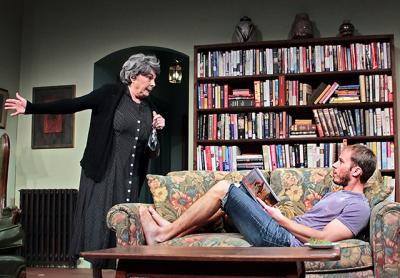'4000 Miles' and What Happens Next in Quogue

It has become trite and almost insulting to revel in the quality of the Hampton Theatre Company’s productions, which are clearly some of the finest community theater around, here or anywhere. After years of well-received presentations and full houses, it would be better to take it as a given that whatever the group tackles will be handled with deftness and polish.
The company’s latest play, “4000 Miles,” matches Amy Herzog’s Pulitzer-nominated and Obie-winning text with the versatile acting chops of some of the company’s regulars and with Samantha Herrera’s first HTC appearance.
It is Sarah Hunnewell’s direction and the acting of the four principals, in a well-designed set that never changes, which creates the chemistry that brings this dramatic comedy alive and draws us in. It is the award-winning writing that stays with us on the drive home.
The play opens with the 3 a.m. arrival of Leo at his grandmother Vera’s Greenwich Village apartment. She is hard of hearing and doesn’t have her teeth in yet. It’s clear he hasn’t called ahead to announce his arrival after a cross-country bicycle trip.
She is startled, but warm nonetheless. Not quite doting, and not quite encouraging to him to stay, she still seems fine with the possibilities this situation presents. After commanding him to take a shower, she sets him up in the guest bedroom, and it’s immediately apparent that he will stay, at least long enough to let his and her story unfold.
It is quickly revealed that Leo has been out of touch with his friends and family, a significant anomaly in the setting of 2007, the year Apple released its first smartphone. Vera tells him his mother is looking for him. We also learn that his girlfriend, Bec, who attends college in the city, was not happy to see him when he visited her earlier that night.
We gradually discover that Leo has experienced a great tragedy as he made his way across the country, one that left him determined to finish the journey but aimless now that it is over. He needs to regain some measure of routine and purpose in his life, which becomes the leitmotif of the play, along with the significance of family. There is also a vague Marxist subtext.
Ben Schnickel and Diana Marbury, who play Leo and Vera, telegraph a prickly but sympathetic relationship. They turn out not to be relatives in the strict sense, but family members in the best sense. Amanda Griemsmann, who plays Bec, has a small and somewhat thankless role, but manages to make her performance memorable and critical in the mix of relationships and events that push Leo forward. Ms. Herrera seems to be having the most fun of all with her portrayal of Amanda, a mercurial and quirky art student whom Leo brings to the apartment for a fling.
Sean Marbury’s set delivers exactly what one would expect in a nonagenarian’s rent-controlled West Village flat. Painted a faded bilious green, it has the well-tended but worn look of grandmas’ houses everywhere. The rotary wall phone is a brilliant touch, particularly when Vera dials a number. Clearly, we have stepped into an environment that technology has ignored or left behind.
The lighting design, by Sebastian Paczynski, not only helps set the emotional tone of the play but functions almost as another character, and Teresa Lebrun’s costume designs are adroit in rounding out the actors’ identities. The fancy black ensembles Vera dons for funerals speak to the stylishness that never leaves some city women, even if they are 90, widows of Marxists, or old lefties themselves. Bec immediately reads as both student and outdoorsy, and Amanda looks pulled straight from the nightclub where Leo obviously found her.
It’s always unnerving to be told before a play begins that there will be no intermission, particularly when it runs close to two hours. As a friend of mine likes to say, it’s because the presenters are afraid they will lose everyone at the break. That is not the case here. Although there is an obvious break in the text, the play builds on the emotional intimacy and understanding between grandmother and grandson, and an interruption might sever the emerging threads that connect them to each other. That would be unfortunate in such a layered and poignant story.
“4000 Miles” will continue at the Quogue Community Hall through Jan. 29, with performances Thursdays through Sundays. Tickets are $30 with discounts for students, adults 65 and older, and those under 35, and are available through the Hampton Theatre Company website.
